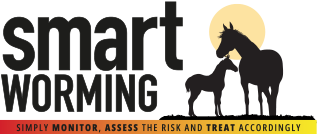What is a worm control plan?
The aim of a worm control plan is to reduce the level of parasites on pasture to reduce the risk of parasite-associated disease. It also helps us to pick how and when to use dewormers, using testing to be sure we target those horses that are mainly responsible for contaminating their pasture. We should no longer be treating all adult horses several times a year; it is much better for the environment and our horses to be selective in how and when we use dewormers.
Reducing the number of dewormers given to horses decreases the spread of resistance and keeps dewormer medicines working for those cases of parasite-associated disease when we really need them to be effective. Choosing how and when to deworm your horse now will affect horse welfare in the future.


